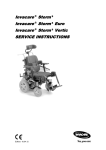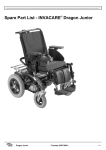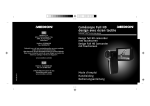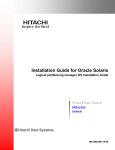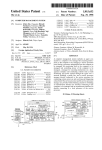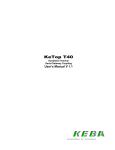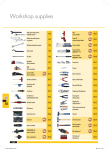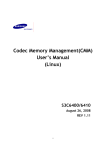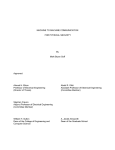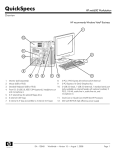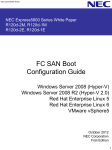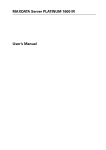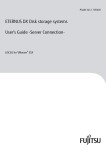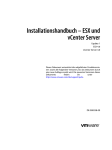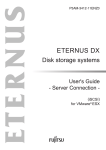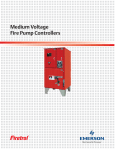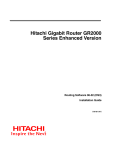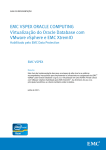Download Installation Guide for VMware
Transcript
Installation Guide for
VMware
FASTFIND LINKS
Document Organization
Product Version
Getting Help
Contents
Hitachi, Ltd.
EBS-DOC-023-51-005
Copyright © 2012 Hitachi, Ltd.
ALL RIGHTS RESERVED
No part of this publication may be reproduced or
transmitted in any form or by any means, electronic
or mechanical, including photocopying and
recording, or stored in a database or retrieval
system for any purpose without the express written
permission of Hitachi, Ltd. (hereinafter referred to
as “Hitachi”).
Hitachi reserves the right to make changes to this
document at any time without notice and assumes
no responsibility for its use. This document contains
the most current information available at the time of
publication. When new and/or revised information
becomes available, this entire document will be
updated and distributed to all registered users.
All of the features described in this document may
not be currently available. For information about
features and product availability, refer to the most
recent product announcement or contact <contact
information>.
Notice: Hitachi products and services can be ordered
only under the terms and conditions of Hitachi’s
applicable agreement(s). The use of Hitachi products
is governed by the terms of your agreement(s) with
Hitachi.
Hitachi is a registered trademark of Hitachi, Ltd. in
Japan and other countries.
Hitachi Compute Blade (hereinafter referred to as
“Compute Blade”.) is a trademark of Hitachi.
All other trademarks, service marks, and company
names are properties of their respective owners.
ii
Installation Guide for VMware
Contents
Preface .................................................................................................... v
Intended audience ............................................................................................... vi
Document revision level ........................................................................................ vi
Document organization ......................................................................................... vii
Document conventions ........................................................................................ viii
Getting help ......................................................................................................... ix
Comments ........................................................................................................... ix
ESXi 5.x Installation and Setup ............................................................... 1-1
General Information ........................................................................................... 1-2
Prerequisites ...................................................................................................... 1-4
Installing ........................................................................................................... 1-7
Settings after installation .................................................................................... 1-9
ESX 4 Installation and Setup................................................................... 2-1
General Information ........................................................................................... 2-2
Prerequisites ...................................................................................................... 2-3
Installing ........................................................................................................... 2-9
Settings after installation .................................................................................. 2-11
Notes .............................................................................................................. 2-13
Acronyms and Abbreviations .......................................................Acronyms-1
Index ..............................................................................................Index-1
Contents
Installation Guide for VMware
iii
(This page is intentionally left blank.)
iv
Contents
Installation Guide for VMware
Preface
This preface includes the following information:
Intended audience
Document revision level
Document organization
Document conventions
Getting help
Comments
Preface
Installation Guide for VMware
v
Intended audience
This document is intended for the personnel who are involved in planning,
managing, and performing the tasks to prepare your site for Compute Blade
installation and to install the same.
This document covers the necessary procedure on Installation and Setup required
for Compute Blade 2000, 320 and 500.
This document assumes the following:
•
The reader has a background in hardware installation of computer systems.
•
The reader is familiar with the location where the Compute Blade will be
installed, including knowledge of physical characteristics, power systems and
specifications, and environmental specifications.
Document revision level
Revision
Date
Description
000
January 2012
New Release
001
April 2012
ESXi 5.0 Installation and Setup
Prerequisites
Add information of BS500 in the following items.
-
System BIOS version
-
Hitachi Customized ESXi 5.0 Installer
Update drivers and utilities
Add description about lpfc820 driver in ESXi 5.0
Update1
Patches to ESXi
Notes on updating patch
ESX 4 Installation and Setup
Prerequisites
Add notes when enabling NUMA.
Modify description about error message when
mounting 1TB memories
002
-
N/A
003
June 2012
Add description about the followings.
- Hitachi Custom Image version 01-01
- Command options when applying ESXi patch
004
vi
July 2012
Change the documentation title from ‘VMware Setup
Guide’ to ‘Installation Guide for VMware’
Preface
Installation Guide for VMware
Revision
005
Date
Oct 2012
Description
Add description about the followings.
1-1 ESXi 5.x Installation and Setup
1-2 Related Documentation
1-4 System BIOS version
1-5 Hitachi Customized ESXi 5.x Installer
1-6 FC adapters and FC switch versions
1-6 Boot from SAN
1-7 Minimum system Requirements
1-7 Connecting iSCSI array when using Emulex CNA
1-9 Disable NetQueue when using Broadcom 5718/5719
NICs
1-11 Update drivers and utilities
1-11 Modify ESXi setting to avoid PSOD when installing
Intel Xeon E5-2600 processor series.
1-11 vMotion CPU Compatibility
2-1 ESX 4 Installation and Setup
2-3 LSI MegaRAID SAS (megaraid_sas)"
2-7 FC adapters and FC switch versions
2-7 Boot from SAN
2-9 Notes on enabling NUMA mode
Document organization
The table below provides an overview of the contents and organization of this
document. Click the chapter title in the left column to go to that chapter. The first
page of each chapter provides links to the sections in that chapter.
Chapter
Chapter 1,
ESXi 5.x Installation and
Setup
Chapter 2,
ESX 4 Installation and
Setup
Description
This chapter describes how to install and setup VMware ESXi 5.x on Hitachi
Compute Blade.
This chapter describes how to install and setup VMware ESX 4.0 and ESX
4.1 on Hitachi Compute Blade.
Preface
Installation Guide for VMware
vii
Document conventions
This term “Compute Blade” refers to all the models of the Compute Blade, unless
otherwise noted.
This document uses the following typographic conventions:
Convention
Description
Bold
Indicates text on a window, other than the window title, including menus, menu
options, fields, and labels. Example: Click OK.
Italic
Indicates a variable, which is a placeholder for actual text provided by the user
or system. Example: copy source-file target-file
Note: Angled brackets (< >) are also used to indicate variables.
screen/code
Indicates text that is displayed on screen or entered by the user.
Example: # pairdisplay -g oradb
< > angled brackets
Indicates a variable, which is a placeholder for actual text provided by the user
or system. Example: # pairdisplay -g <group>
Note: Italic font is also used to indicate variables.
[ ] square brackets
Indicates optional values. Example: [ a | b ] indicates that you can choose a, b,
or nothing.
{ } braces
Indicates required or expected values. Example: { a | b } indicates that you
must choose either a or b.
| vertical bar
Indicates that you have a choice between two or more options or arguments.
Examples:
[ a | b ] indicates that you can choose a, b, or nothing.
{ a | b } indicates that you must choose either a or b.
underline
Indicates the default value. Example: [ a | b ]
This document uses the following icons to draw attention to information:
Icon
WARNING
CAUTION
NOTICE
viii
Meaning
Description
WARNING
Indicates the presence of a potential risk that might cause death or
severe injury.
CAUTION
Indicates the presence of a potential risk that might cause relatively
mild or moderate injury.
NOTICE
Indicates the presence of a potential risk that might cause severe
damage to the equipment or damage to surrounding properties.
Note
Indicates notes not directly related to injury or severe damage to the
equipment.
Tip
Indicates advice on how to make the best use of the equipment.
Preface
Installation Guide for VMware
Getting help
When you contact <contact information>, please provide as much information
about the problem as possible, including:
•
The circumstances surrounding the error or the failure
•
The exact content of any error message displayed on the host system Compute
Blade
•
The service information messages, including reference codes and severity
levels, displayed and/or logged at the Compute Blade
The <sales partner> support staffs are available 24 hours a day, seven days a
week. For technical support, visit the portal site at <portal site URL>. For contact
information, visit <sales partner’s homepage URL>.
Comments
Please send us your comments on this document, if any, by e-mail to: <e-mail
address>. Make sure that the e-mail includes the document title and number,
revision, and section(s) and paragraph(s) whenever possible.
Thank you! (All comments become the property of Hitachi.)
Preface
Installation Guide for VMware
ix
x
Preface
Installation Guide for VMware
1
ESXi 5.x Installation and Setup
This chapter describes how to install and setup VMware ESXi 5.x on Hitachi
Compute Blade.
General Information
Prerequisites
Installing
Settings after installation
1-1
General Information
Related documentation
The following web site provides the documents how to install, configure and
operate VMware ESXi 5.x.
Please see these documents before installation.
http://www.vmware.com/support/pubs/vsphere-esxi-vcenter-serverpubs.html
Please also see the following Guides if needed.
Guest Operating System Installation Guide
http://partnerweb.vmware.com/GOSIG/home.html
VMware Product Interoperability Matrix
http://partnerweb.vmware.com/comp_guide2/sim/interop_matrix.php
Configuration Maximums
ESXi 5.0:
http://www.vmware.com/pdf/vsphere5/r50/vsphere-50-configurationmaximums.pdf
ESXi 5.1:
http://www.vmware.com/pdf/vsphere5/r51/vsphere-51-configurationmaximums.pdf
For a complete list of known issues in the ESXi 5.x release, please see the
vSphere 5.x Release Notes.
VMware vSphere® 5.0 Release Notes:
https://www.vmware.com/support/vsphere5/doc/vsphere-esx-vcenter-server50-release-notes.html
VMware vSphere® 5.1 Release Notes:
https://www.vmware.com/support/vsphere5/doc/vsphere-esx-vcenter-server51-release-notes.html
1-2
Also the VMware Knowledge Base provides various solutions and
troubleshooting guide.
VMware Knowledge Base
http://kb.vmware.com/
Hardware Compatibility
Hitachi Compute Blade servers are certified for each ESXi version by VMware. For
detailed information about ESXi Server hardware compatibility of Hitachi Compute
Blade servers, search the VMware Compatibility Guide with 'Hitachi' as 'Partner
Name'.
VMware Compatibility Guide
http://www.vmware.com/go/hcl
1-3
Prerequisites
System BIOS version
When you install ESXi 5.x to Hitachi Compute Blade, please set the System BIOS
version according to the following tables.
Table 1-1
BIOS version (Compute Blade Model)
Compute Blade Model
Compute Blade
2000
Compute Blade
320
Compute Blade
500
System BIOS version
AX55A1 Model (Xeon 5500 series)
01-64 or later
AX55A2 Model (Xeon 5500/5600 series)
03-50 or later
AX57A1 Model (Xeon 7500 series)
03-24 or later
AX57A2 Model (Xeon E7-8800 series)
07-05 or later
AX55S3/R3 Model (Xeon E5-2600 series)
09-24 or later
AX51A2 Model (Xeon 5100/5300 series)
F46 or later
AX51A3 Model (Xeon 5200/5400 series)
G15 or later
AX51E3 Model (Xeon 5300/5400 series)
G15 or later
AX51A4/S4/H4/P4/R4 Model (Xeon 5500 series)
F13 or later
AX51A5/S5/H5/P5/R5 Model (Xeon 5500/5600 series)
G18 or later
AGC0A1/AGC0B1 (Xeon E5-2600 series)
EP0110 or later
AGB0A1
EN0107 or later
(Xeon E5-2400 series)
AGD0A1/AGD0B1 (Xeon E5-4600 series)
EP4S0104 or later
For the server models which are not listed in the table above, you do not require
to update the System BIOS from the factory default.
1-4
Hitachi Customized ESXi 5.x Installer
When you install ESXi 5.x to Hitachi Compute Blade, please use VMware ESXi 5.x
Installable Hitachi Custom ISO Image which includes drivers necessary to
install Hitachi Compute Blade servers.
You can download appropriate VMware ESXi 5.x Installable Hitachi Custom
ISO Image at the Drivers and Tools - OEM Customized Installer CDs section
of the VMware Download Center.
Table 1-2
Hitachi Custom Image Version
Hitachi
ESXi
Custom
base
Compute Blade Model
Compute Blade
Compute Blade
Compute Blade
Image
version
2000
320
500
01-00 (*1)
ESXi 5.0.0
AX55A1
AX51A2
N/A
ESXi-5.0.0-
build 469512
AX55A2
AX51A3
AX57A1
AX51E3
AX57A2
AX51*4
version
01-01
AX51*5
ESXi-5.0.0-
ESXi 5.0.0
AX55A1
AX51A2
AGC0A1
Update1-
U1
AX55A2
AX51A3
AGC0B1
02-00
build 623860
AX57A1
AX51E3
AGB0A1
AX57A2
AX51*4
AGD0A1
AX55S3
AX51*5
AGD0B1
AX55R3
ESXi-5.1.0-
ESXi 5.1.0
AX55A1
AX51A2
AGC0A1
01-00
build 799733
AX55A2
AX51A3
AGC0B1
AX57A1
AX51E3
AGB0A1
AX57A2
AX51*4
AGD0A1
AX55S3
AX51*5
AGD0B1
AX55R3
(*1) The version 01-00 of Hitachi Custom Image contains a defect which
prevent from users to apply patch with specifying ‘update’ options.
Hitachi strongly recommends to install ESXi 5.0 update 1 or later using Hitachi
Custom Image version 02-00 or later for fresh installation. However, if you
need to install ESXi 5.0, please use the version 01-01 of Hitachi Custom Image
which is available on VMware Download Center.
FC adapters and FC switch versions
When you use N-Port ID Virtualization (NPIV) feature, you have to connect the
storage through the FC adapters and the switches which support the NPIV feature.
The following table shows the firmware version of the FC adapters and the
switches which support NPIV feature.
1-5
FC Adapters
Table 1-3
FC adapters and the firmware versions
Fibre Channel Board
Hitachi
CB2000 FIVE-EX
FIVE
FIVE-EX
Firmware Version
GV-CC2N8G2N1/GV-CC2N8G2N1EX
30-04-39 or later
GV-CC2N8G1N1/GV-CC2N8G1N1EX
30-04-39 or later
GV-CC2D8G2N1/GV-CC2D8G2N1EX
30-04-39 or later
GV-CC2D8G1N1/GV-CC2D8G1N1EX
30-04-39 or later
GV-CC2M8G2N1/GV-CC2M8G2N1EX
30-04-39 or later
GV-CC2M8G1N1/GV-CC2M8G1N1EX
30-04-39 or later
GV-CC2M4G1N1/GG-CC2M4G1N1EX
26-08-10 or later
GV-CC2N4G1N1/GV-CC2N4G1N1BX
26-08-10 or later
CB320 FIVE-EX
GG-CC9P8G2N1/GG-CC9P8G2N1EX
30-04-39 or later
CB320 FIVE
GG-CC9MZFC1/GG-CC9MZFC1EX
23-07-76 or later
GG-CC9M4G1N1/GG-CC9M4G1N1EX
23-07-76 or later
GG-CC9P4G1N1/GG-CC9P4G1N1EX
26-08-10 or later
GG-CC3M8G2N1/GG-CC3M8G2N1EX
39-04-5A or later
GG-CC3M8G2N2/GG-CC3M8G2N2EX
39-04-5A or later
CB2000 FIVE
CB500 FIVE-EX
FC switches
The Fabric OS version should be v5.3.2a or later.
Boot from SAN
If you install ESXi to boot from SAN, you have to follow the configuration rules and
select the appropriate settings to the Server chassis, the Fibre Channel adapters,
the SAN storage systems and the Fibre Channel switches.
Please consult the reseller from which you purchased the product for details about
updates for the SAN environment configuration.
Focusing on installing ESXi 5.x to boot from SAN, please set the followings;
●
●
1-6
Create the boot disk on LU0 when installing ESXi. In this case, the
boot disk means the disk which stores the boot loader of ESXi. The
System BIOS identifies this disk as ID x’80’ by INT 13H.
On compute Blade 320, the following settings are required.
AX51A5: ‘SAS Option ROM’ should be ‘Disabled’ on the System
BIOS.
AX51R5: ‘Boot Disabled’ should be set on RAID BIOS and ‘SAS
Option ROM’ should remain unchanged (‘Enabled’).
●
On compute Blade 2000, ‘SAS Option ROM’ should be ‘Disabled’ on
the System BIOS.
Please also see vSphere Storage for how to configure your host before installation.
NIC teaming
Please follow the configuration rules when you configure NIC teaming. Please see
vSphere Networking for details.
Minimum system Requirements
ESXi requires a minimum of 2GB of physical RAM. However, in some cases,
installing ESXi with just 2GB or memory may fail because the system is using some
memory and less than 2GB is available for ESXi.
For system requirements of ESXi, please see vSphere Installation and Setup and
the following article on VMware KB for details.
Minimum system requirements for installing ESX/ESXi
(KB 1003661)
Connecting iSCSI array when using Emulex CNA
You must set up your iSCSI adapters and storage before ESXi can work with a SAN.
Please see vSphere Storage for details.
Please also see the following document for specifically focusing on Emulex CNA
adapter.
Boot for NIC, iSCSI, and FCoE Protocols User Manual
http://www-dl.emulex.com/support/hardware/documentation/nif/1203/oc_boot_manual.pdf
Installing
Installing
When installing ESXi, you can use ESXi CD/DVD or you can specify ISO image
directly when connecting a server using Remote Console.
Please use the appropriate VMware ESXi 5.x Installable Hitachi Custom ISO
Image
1-7
For installation procedure of ESXi, please see vSphere Installation and
Setup.for details.
1-8
Settings after installation
Management LAN Port on Compute Blade 2000
On all Compute Blade 2000 servers, Intel® 82567LF-2 Gigabit Network Connection
is a management LAN port. Do not use this network adapter on ESXi.
The network adapter is identified as vmnic<number> on ESXi and Intel® 82567LF2 Gigabit Network Connection is assigned as the smallest number.
After installing ESXi on Compute Blade, please select another network adapter.
Please see vSphere Installation and Setup for how to choose the network adapter
after installation.
Hardware NMI facilities to troubleshoot unresponsive host
When a hardware failure happens, the hardware generates interrupt called NonMaskable Interrupt (NMI) which cannot be ignored by the processer.
If the CPU receives NMI, the system should be stopped because subsequent
system processing in such case may cause unexpected behavior of the system.
On ESXi 5.x, the VMkernel always handles the NMI by halting with a purple
diagnostic screen by default. No additional configuration is needed on ESXi 5.x.
For details how to configure ESX, please see the following article on VMware KB for
details.
Using hardware NMI facilities to troubleshoot unresponsive hosts
(KB1014767)
Time Zone
The ESXi 5.x identifies the server hardware clock as UCT time zone. Please adjust
time from vSphere Client.
Disable NetQueue when using Broadcom 5718/5719 NICs
Disabling NetQueue for 1Gb NICs, such as Broadcom 5718 and 5719 is highly
recommended. Please see the following article on VMware KB for details.
Broadcom 5719/5720 NICs using tg3 driver becomes unresponsive and
stops traffic in vSphere
(KB 2035701)
Patches to ESXi
Please apply patches if needed. You can download the latest patches to ESXi from
the following web site.
1-9
http://downloads.vmware.com/go/selfsupport-download
You can also get patches automatically if you configure to use vSphere Update
Manager.
Note that basically ESXi patches can not be removed once they applied to ESXi.
Therefore, please read Release Notes carefully whether you apply the patch.
If the released patch triggers another problem, the new patch will be released to
fix the problem.
Notes on updating patch
If you install ESXi using Hitachi Custom Image, apply patch with specifying ‘esxcli
software profile update’ command.
Hitachi Custom Image contains several newer versions of inbox drivers, for
example, tg3, lpfc820 and be2net to support new devices and an outbox driver
such as hfcldd.
Applying the patch with specifying ‘software profile install’ option forces ESXi to
install VIBs present in the depot image profile, and remove any other VIBs install
on the target server. Therefore, if you use the devices which inbox drivers do not
cover and are also supported only by the outbox driver, the devices will not be
identified after reboot.
The ‘software profile update’ option updates existing VIBS with the corresponding
VIBs from the specified profile, but does not affect other VIBs installed on the
target server.
If you installed ESXi using the version 01-00 of “Hitachi Custom Image for ESXi
5.0.0 GA Install CD (File Name: VMware-ESXi-5.0.0-469512-hitachi-0100.iso)
downloaded from the VMware Downloaded Center, please apply an ESXi patch
using the option, ‘software vib install’. The esxcli command fails when specifying
‘software profile update’ option.
However, if you updated the drivers from inbox to newer version of outbox
asynchronous drivers, it may be downgraded by applying patch using this option.
In this case, you need to re-install outbox asynchronous drivers every time you
applying patch. To avoid this maintenance inconvenience, Hitachi recommends that
you re-install ESXi using the Hitachi Custom Image version 01-01, or 02-00 or later
when updating ESXi.
For details how to upgrade ESXi, please refer to ESXi and vCenter Server product
documentations including vSphere Upgrade.
1-10
Update drivers and utilities
Please update drivers of adapters if needed. Drivers are required to reboot the ESXi
after installation.
The latest drivers are available on VMware download center at the Drivers &
Tools–Driver CDs section of the VMware Download Center.
For the latest utilities for adapters, please download them from the third party’s
website respectively. Some tools may require to reboot the ESXi after installation.
Emulex Fibre Channel Adapter driver (lpfc820)
When you use Emulex Fibre Channel Adapter in ESXi 5.0 Update 1 or later,
please update lpfc820 driver to async outbox driver, version 8.2.2.126.50.
If you install ESXi 5.x using VMware ESXi 5.0.0 Update 1 Installable
Hitachi Custom ISO Image and VMware ESXi 5.1.0 Installable Hitachi
Custom ISO Image, the driver of this version has already been preinstalled
in Custom ISO image. You do not install the driver after installation.
Modify ESXi setting to avoid PSOD when installing Intel
Xeon E5-2600 processor series.
When you use the server installing Intel Xeon E5-2600 series, PSOD may occur
when the CPU usage of the virtual machine is low.
Please set ‘Cpu.PcpuMigrateIdlePcpus’ of your ESXi to ‘0’ (disabled) using vSphere
client, vSphere web client or vSphere CLI.
This setting applies immediately and reboot is not required. And this setting is
maintained across reboots.
vMotion CPU Compatibility
To migrate a virtual machine with vMotion successfully, BIOS versions of the
source and the target host should be the same and the processors should be within
CPU compatibility group. However, even if your hosts meet these requirements,
vMotion may fail depending on BIOS settings (AES/AVX and XSAV) of the hosts.
Using Enhanced vMotion Compatibility (EVC) eliminates many VMotion CPU
compatibility problems.
For details, please see the following article.
vMotion CPU Compatibility Requirements for Intel Processors (KB 1991)
Enhanced VMotion Compatibility (EVC) processor support (KB 1003212)
1-11
2
ESX 4 Installation and Setup
This chapter describes how to install and setup VMware ESX 4.0 and ESX 4.1
on Hitachi Compute Blade.
General Information
Prerequisites
Installing
Setting after Installation
Notes
2-1
General Information
Related documentation
The following web sites provide the documents how to install, configure and
operate VMware ESX 4.0 and 4.1 including Release Notes.
Please see these documents before installation.
VMware vSphere 4 Documentation (ESX 4.1)
http://www.vmware.com/support/pubs/vs_pages/vsp_pubs_esx41_vc41.html
VMware vSphere 4 Documentation (ESX 4.0)
http://www.vmware.com/support/pubs/vs_pages/vsp_pubs_esx40_vc40.html
Also the VMware Knowledge Base provides various solutions and
troubleshooting guide.
VMware Knowledge Base
http://kb.vmware.com/selfservice/microsites/microsite.do
Hardware Compatibility
Hitachi Compute Blade servers are certified for each ESX version by VMware. For
detailed information about ESX Server hardware compatibility of Hitachi Compute
Blade servers, search the VMware Compatibility Guide with 'Hitachi' as 'Partner
Name'.
VMware Compatibility Guide
http://www.vmware.com/go/hcl
2-2
Prerequisites
System BIOS version
When you install ESX to Hitachi Compute Blade, the System BIOS version of each
model should be set according to the following tables.
Table 2-1
System BIOS version
Compute Blade Model
System BIOS version
Compute Blade
2000
AX55A1 Model (Xeon 5500 series)
01-37 or later
Compute Blade
320
AX51A4/S4/H4/P4/R4 Model (Xeon 5500 series)
F9 or later
For the server models which are not listed in the table above, you do not require
to update the System BIOS from the factory default.
If you use VMware Fault Tolerance (FT), please set the System BIOS version
according to the following tables.
Table 2-2
System BIOS version (When using VMware FT feature)
Compute Blade Model
System BIOS version
Compute Blade
2000
AX55A1 Model (Xeon 5500 series)
03-23
AX55A2 Model (Xeon 5500 series or Xeon 5600 series)
03-23
Compute Blade
320
AX51P4 Model (Xeon 5500 series)
F12
AX51P5 Model (Xeon 5500 series or Xeon 5600 series)
G7
System BIOS settings
APIC Mode
If you use 4-Blade SMP configuration on Compute Blade 2000 AX57A2 model,
please change APIC mode to xAPIC.
ESX Installer
When installing ESX to Hitachi Compute Blade, please download the ESX Installer
from VMware Download Center.
Necessary drivers for installation.
You can download the necessary drivers at the Related Drivers and ToolsDriver CDs section of the VMware Download Center.
vSphere 4.1 (ESX 4.1)
2-3
http://downloads.vmware.com/d/info/datacenter_cloud_infrastructure/vmwar
e_vsphere/4_1
vSphere 4.0 (ESX 4.0)
http://downloads.vmware.com/d/info/datacenter_cloud_infrastructure/vmwar
e_vsphere/4_0
Hitachi Fibre Channel adapter driver (hfcldd)
When you install ESX to boot from SAN using Hitachi Fibre Channel Adapter,
you need Driver CD for Hitachi hfcldd driver.
Please download Driver CD for the latest VMware ESX/ESXi 4.X Driver CD
for Hitachi hfcldd Driver.
Intel Gigabit Ethernet driver (igb)
You need Driver CD for Intel Gigabit Ethernet Controller only if your
configuration meets the following conditions.
●
Install ESX 4.0 Update 0 or Update 1. (You do not need to embed this
igb driver when you install ESX 4.0 update 2 or later, or ESX 4.1)
●
Your Compute Blade is listed on the following table.
Please download Driver CD for VMware ESX/ESXi 4.0 Driver CD for Intel
82575 and 82576 Gigabit Ethernet Controller.
Table 2-3
Compute Blade Models require an outbox igb driver
Compute Blade Model
Compute Blade 2000
AX55A1 Model
AX55A2 Model
AX57A1 Model
AX57E1 Model
Compute Blade 320
AX51A4/S4/H4/P4/R4 Model
AX51A5/S5/H5/P5/R5 Model
Also, if you use Intel 1Gb 4port LAN board, you need the appropriate version
of igb driver. Please download Driver CD for VMware ESX/ESXi 4.x Driver
CD for Intel 82576, 82580 and I350 Gigabit Ethernet Controller (Driver
version should be 3.0.18 or later).
Intel 10 Gigabit Ethernet driver (ixgbe)
You need to Driver CD for Intel 10 Gigabit Ethernet Controller when you install
ESX only if your configuration meets the following conditions.
2-4
●
When you use Intel 10 Gigabit Server Adapter X520 Series.
●
Your Compute Blade is listed on the following table.
Table 2-4
Compute Blade Models require an outbox ixgbe driver
Compute Blade Model
Compute Blade 2000
AX55A2 Model
AX57A1 Model
Compute Blade 320
AX51P5 Model
Please download Driver CD for VMware ESX/ESXi 4.x Driver CD for Intel
82598 and 82599 10 Gigabit Ethernet Controllers (Driver version should
be 2.0.84.9 or later).
Emulex Fibre Channel Adapter driver (lpfc820)
You need Driver CD for Emulex Fibre Channel Adapter only if your
configuration meets the following conditions.
●
Install ESX 4.0
●
Your Compute Blade is listed on the following table.
Table 2-5
Compute Blade Models require an outbox lpfc820 driver
Compute Blade Model
Compute Blade 2000
AX55A1 Model
AX55A2 Model
AX57A1 Model
AX57E1 Model
Please download Driver CD for VMware ESX/ESXi 4.0 Driver CD for
Emulex lpfx820 (Driver version should be 8.2.0.71.17 or later).
2-5
Broadcom 1 Gigabit Ethernet driver (tg3)
You need Driver CD for Broadcom Gigabit Ethernet Adapter if you use
Compute Blade servers, mezzanine cards and adapters listed on the following
table.
Table 2-6
Mezzanine cards and adapter requires an outbox tg3 driver
Compute Blade Model
Compute
Blade
2000
AX55R3 Model (On board NIC)
Compute
Blade 500
SAS/LAN
AX55S3 Model (On board NIC)
RAID w/ 1Gb 4p LAN mezzanine
RAID w/ 1Gb 8p LAN mezzanine
LAN
1Gb 4p LAN mezzanine
1Gb 8p LAN mezzanine
Please download Driver CD for VMware ESX/ESXi 4.x Driver CD for
Broadcom NetXtreme I Gigabit Ethernet Driver (Driver version should be
3.120h.v40.1 or later).
Emulex 10 Gigabit Ethernet driver (be2net)
You need Driver CD for Broadcom Gigabit Ethernet Adapter if you use
Compute Blade servers, mezzanine cards and adapters listed on the following
table.
Table 2-6
Mezzanine cards and adapters require an outbox be2net driver
Compute Blade Model
Compute
Blade
2000
LAN
10Gb LAN mezzanine
CNA
10Gb CNA adapter
10Gb CNA mezzanine
Compute
Blade 500
LAN
10Gb 4p LAN mezzanine
CNA
10Gb 4p CNA mezzanine
AGC0B1 Model (On board NIC)
Please download Driver CD for VMware ESX 4.0/4.1 Driver CD for Emulex
OneConnect OCe10102 10GbE Adapter (Network Function) (Driver
version should be 4.1.334.0 or later).
LSI MegaRAID SAS (megaraid_sas)
When you use the following Compute Blade servers, mezzanine cards and
adapters, please use megaraid_sas driver, version 00.00.05.37. This driver
fixes the issue of potential PSOD when Abort command is issued to internal
RAID under high I/O load.
2-6
Table 2-7
Mezzanine cards and adapters require megaraid_sas driver
Compute Blade Model
Compute
Blade
2000
Compute
Blade 320
Compute
Blade 500
SAS
SAS
SAS
SAS1078
LSI SAS internal RAID board
SAS2108
LSI SAS internal RAID board
SAS2208
AX55R3 model (On board RAID)
SAS1078
AX51H4/ AX51H5 Model
SAS2108
AX51H5 Model
SAS2008
AX51R4/ AX51R5 Model
SAS2008
RAID mezzanine card
SAS2208
LSI SAS RAID card
Please download Driver CD for VMware ESX/ESXi 4.x Driver CD for LSI
MegaRAID SAS Controllers (Driver version should be 00.00.05.37).
FC adapters and FC switch versions
When you use N-Port ID Virtualization (NPIV) feature, you have to connect the
storage through the FC adapters and the switches which support the NPIV feature.
The following table shows the firmware version of the FC adapters and the
switches which support NPIV feature.
FC Adapters
Please see the section, FC adapters and FC switch versions on Chapter 1,
ESXi 5.x Installation and Setup.
FC switches
The Fabric OS version should be v5.3.2a or later.
Boot from SAN
If you install ESX to boot from SAN, you have to follow the configuration rules and
select the appropriate settings to the Server chassis, the Fibre Channel adapters,
the SAN storage systems and Fibre Channel switches.
Please consult the reseller from which you purchased the product for details about
updates for the SAN environment configuration.
Focusing on installing ESX 4.0 or 4.1 to boot from SAN, please set the followings;
●
●
Create the boot disk on LU0 when installing ESX. In this case, the
boot disk means the disk which stores the boot loader of ESX. The
System BIOS identifies this disk as ID x’80’ by INT 13H.
On compute Blade 320, the following settings are required.
2-7
AX51A5: ‘SAS Option ROM’ should be ‘Disabled’ on the System
BIOS.
●
AX51R5: ‘Boot Disabled’ should be set on RAID BIOS and ‘SAS
Option ROM’ should remain unchanged (‘Enabled’).
On compute Blade 2000, ‘SAS Option ROM’ should be ‘Disabled’ on
the System BIOS.
Please also see Fibre Channel SAN Configuration Guide for how to configure
your host before installation.
vSphere 4.1 (ESX 4.1)
http://www.vmware.com/pdf/vsphere4/r41/vsp_41_san_cfg.pdf
vSphere 4.0 (ESX 4.0)
http://www.vmware.com/pdf/vsphere4/r40/vsp_40_san_cfg.pdf
Notes on enabling NUMA mode
When the hardware supports Non-Uniform Memory Access (NUMA) and an unequal
amount memory is allocated to each NUMA node, ESXi host fails to start or install
with the error: The BIOS reports that NUMA node X has no memory.
When you need to enable NUMA, configure your hardware to have an equal amount
of memory on each NUMA node.
Please see the following article on VMware KB for details.
ESX host fails to start or install with the error: The BIOS reports that NUMA node X
has no memory (KB 1016154)
2-8
Installing
Installing
When installing ESX, you can use ESX CD/DVD or you can specify ISO image
directly when connecting a server using Remote Console.
For installation procedure of ESX, please see ESX and vCenter Server
Installation Guide details.
vSphere 4.1 (ESX 4.1)
http://www.vmware.com/pdf/vsphere4/r41/vsp_41_esx_vc_installation_guide
.pdf
vSphere 4.0 (ESX 4.0)
http://www.vmware.com/pdf/vsphere4/r40/vsp_40_esx_vc_installation_guide
.pdf
When using Remote Console Application
Remote CD/DVD and Remote FD
When you install VMware ESX 4.0 or 4.1 using Remote CD/DVD feature with
ISO image, please connect both remote FD and remote CD/DVD before turning
on the power of the server
If the remote FD is not connected, ESX installer may fail to switch ISO image
and stop installation process. It leads to installation failure eventually.
Graphical Installation
When you install VMware ESX 4.1 using Remote CD/DVD feature in the
graphical mode, ESX installation may fail because the installer fails to identify
the appropriate video driver.
Please add the following parameter to Boot options when you choose graphical
installation mode during installation. You can modify options by pressing F2
key.
(space)videodriver=vesa
2-9
Bootloader option settings
The reboot after installation may fail when you install ESX 4.0 on Compute
Blade 2000 AX57A1 model which mounts over 256GB memories. You have to
let Boot loader know the memory size mounted on the system with adding the
option to Boot loader.
To add the option to Boot loader, execute the following procedure.
(1)
Select Advanced Setup on Setup Type screen when installation.
(2)
Uncheck the checkbox of Configure boot loader automatically.
(3)
After setting the disk partition, enter the following options as Kernel
Arguments on Set Bootloader Options screen.
Vmkopts=memLowReservedMaxMB:512
Management LAN Port on Compute Blade 2000
On Compute Blade 2000 AX55A1, AX55A2 and AX57A1 models, Intel® 82567LF-2
Gigabit Network Connection is a management LAN port. Do not use this network
adapter on ESX.
The Intel® 82567LF-2 Gigabit Network Connection is listed the top of the identified
network cards. Please select another network adapter.
Time Zone
The ESX 4.0 identifies the server hardware clock as UCT time zone.
Please set appropriate time at Date and Time screen which sets the system time
when installation.
Adjusting time at Date and Time screen modifies the system time after the
subsequent reboot when installation completes.
2-10
Settings after installation
Hardware NMI facilities to troubleshoot unresponsive host
When a hardware failure happens, the hardware generates interrupt called NonMaskable Interrupt (NMI) which cannot be ignored by the processer.
If the CPU receives NMI, the system should be stopped because subsequent
system processing in such case may cause unexpected behavior of the system.
ON ESX 4.0 and 4.1, the host takes no action by default. You have to configure
ESX to halt with a purple diagnostic screen.
For details how to configure ESX, please see the following article on VMware KB for
details.
Using hardware NMI facilities to troubleshoot unresponsive hosts
(KB1014767)
Using Remote CD/DVD or Remote FD feature
When you use Remote CD/DVD or Remote FD feature of Remote Console, you need
an additional setting to make ESX identify these as a remote device.
Please change the assignment rule of storage path module according to the
following procedure.
(1)
Log on to Service Console as root privilege
(2)
Execute the following commands.
# esxcli nmp satp deleterule –satp=VMW_SATP_DEFAULT_AA –V HITACHI
(3)
Reboot ESX
Patches to ESX
Please apply patches if needed. You can download the latest patches to ESX from
the following web site.
http://downloads.vmware.com/go/selfsupport-download
You can also get patches automatically if you configure to use vSphere Update
Manager.
Note that basically ESX patches can not be removed once they applied to ESX.
Therefore, please read Release Notes carefully whether you apply the patch.
If the released patch triggers another problem, the new patch will be released to
fix the problem.
2-11
Update drivers and utilities
Please update drivers of adapters if needed. Drivers are required to reboot the ESX
after installation.
The latest drivers are available on VMware download center at the Drivers &
Tools–Driver CDs section of the VMware Download Center.
vSphere 4.1 (ESX 4.1)
http://downloads.vmware.com/d/info/datacenter_cloud_infrastructure/vmware_vs
phere/4_1
vSphere 4.0 (ESX 4.0)
http://downloads.vmware.com/d/info/datacenter_cloud_infrastructure/vmware_vs
phere/4_0
For the latest utilities for adapters, please download them from third party’s
website respectively. Some tools may require to reboot the ESX after installation.
Disable NetQueue when using Broadcom 5718/5719 NICs
Disabling NetQueue for 1Gb NICs, such as Broadcom 5718 and 5719 is highly
recommended. Please see the following article on VMware KB for details.
Broadcom 5719/5720 NICs using tg3 driver becomes unresponsive and
stops traffic in vSphere (KB 2035701)
vMotion CPU Compatibility
To migrate a virtual machine with vMotion successfully, BIOS versions of the
source and the target host should be the same and the processors should be within
CPU compatibility group. However, even if your hosts meet these requirements,
vMotion may fail depending on BIOS settings (AES/AVX and XSAV) of the hosts.
Using Enhanced vMotion Compatibility (EVC) eliminates many VMotion CPU
compatibility problems.
For details, please see the following article.
vMotion CPU Compatibility Requirements for Intel Processors (KB 1991)
Enhanced VMotion Compatibility (EVC) processor support (KB 1003212)
2-12
Notes
Error message when mounting 1TB memories
When you install ESX on the server with 1TB of memory, around 2GB memory may
be remapped above the 1TB limit.
However, ESX can only handle a memory address up to 1TB so around 2GB
memories allocated over 1TB address remain unused.
Therefore the following error message appears at the main screen when booting.
This message has no impact on the execution of ESX except around 2GB memories
can not be used.
XXXX MB of memory ignored because the system exceeded the supported host physical
page number of XXXXXXX
(X means numeric character)
Please see the following article on VMware KB for details.
ESX console message: XXXX MB of memory ignored because the system
exceeded the supported host physical page number
(KB 1026483)
Memory mirror mode on Compute Blade 2000
Do not select Mirror Channel Mode at the settings of Memory RAS Mode on
System BIOS when you use ESX on Compute Blade 2000 AX57A1 model.
If the Mirror Channel Mode is selected, ESX may fail to boot.
The setting is Lockstep Channel Mode by factory default.
2-13
2-14
3
Acronyms and Abbreviations
BSMI
Bureau of Standards, Metrology and Inspection
CD
Compact Disk
CPU
Central Processing Unit
CRU
Customer Replaceable Units
DBS
Deep Brain Stimulation
DCB
Direct Copper Bonding
DIMM
Dual Inline Memory Module
DVD
Digital Versatile/Video Disk
EFI
Extensible Firmware Interface
EIA
Environmental Impact Assessment
FC
Fibre Channel
FCC
Federal Communications Commission
FD
Floppy Disk
FTP
File Transfer Protocol
HDD
Hard Disk Drive
ID
Identity Document
IO
Input/Output
IP
Internet protocol
iSCSI
Internet Small Computer System Interface
KVM
Keyboard, Video and Mouse
LAN
Local Area Network
LED
Light Emitting Diode
OS
Operating System
PC
Personal computer
PCI
Peripheral Component Interconnect
SAN
Storage Area Network
SAS
Serial Attached SCSI
SNMP
Simple Network Management Protocol
SSD
Solid State Drive
SVP
SerVice Processor
Acronyms and Abbreviations
Installation Guide for VMware
Acronyms-1
Acronyms-2
USB
Universal Serial Bus
VLAN
Virtual LAN
WEEE
Waste Electrical and Electronic Ezuipment
WWN
World Wide Name
Acronyms and Abbreviations
Installation Guide for VMware
Index
<Insert index, generate all 3 page types in each section of the index, turn off the
same as previous setting in the footers, and then fix the text in the footers.
Repeat each time the index is updated.>
Index
Installation Guide for VMware
Index-1
(This page is intentionally left blank.)
Index-2
Index
Installation Guide for VMware
Installation Guide for VMware
Hitachi, Ltd.
IT Platform Division Group
1, Horiyamashita,
Hadano-shi, Kanagawa-ken
Japan
Phone: +81 463 88 8064
http://www.hitachi.com
Hitachi, Ltd.
EBS-DOC-023-51-005










































